Alumni
-
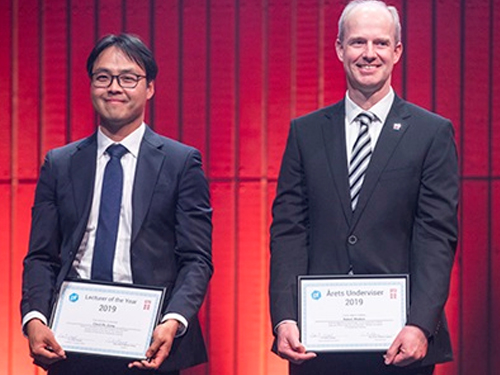 Professor Cheol-Ho Jeong Honored with the DTU Lecturer of the Year
A KAIST alumnus and an associate professor at the Technical University of Denmark (DTU), Dr. Cheol-Ho Jeong was selected as the recipient of the Lecturer of the Year 2019 Award by DTU.
Professor Jeong received his B.S., M.Sc., and Ph. D. degrees from KAIST’s Department of Mechanical Engineering in August 2007 under the supervision of Professor Jeong-Guon Ih, and has been serving as an assistant followed by associate professor at DTU’s Department of Electrical Engineering since October 2007. His research covers wide arrays of architectural acoustics, environmental acoustics, psychoacoustics, and structural acoustics. Every year, the students at DTU nominate one or two lecturer(s) of the year. The award celebrates and honors the selected lecturers for showing great commitment not only to education itself, but also to their communication and engagement with the students.
This year, the DTU student union Polyteknisk Forening nominated Professor Jeong for his outstanding course evaluations for his excellent teaching over the years. One of the student testimonies for the award read, "Professor Jeong is one of the best teachers I have ever had at DTU. He is very humane and approachable."
The awards ceremony was held on May 3 at DTU during the 2019 Annual Commemoration Party and Professor Jeong was warmly congratulated by the Crown Prince Couple of Denmark. The other award was given to Professor Robert Madsen from DTU’s Chemistry department.
©Photo and Quote: Ulrik Jantzen, Büro Jantzen, Camilla Christiane Hermann.
2019.05.30 View 7359
Professor Cheol-Ho Jeong Honored with the DTU Lecturer of the Year
A KAIST alumnus and an associate professor at the Technical University of Denmark (DTU), Dr. Cheol-Ho Jeong was selected as the recipient of the Lecturer of the Year 2019 Award by DTU.
Professor Jeong received his B.S., M.Sc., and Ph. D. degrees from KAIST’s Department of Mechanical Engineering in August 2007 under the supervision of Professor Jeong-Guon Ih, and has been serving as an assistant followed by associate professor at DTU’s Department of Electrical Engineering since October 2007. His research covers wide arrays of architectural acoustics, environmental acoustics, psychoacoustics, and structural acoustics. Every year, the students at DTU nominate one or two lecturer(s) of the year. The award celebrates and honors the selected lecturers for showing great commitment not only to education itself, but also to their communication and engagement with the students.
This year, the DTU student union Polyteknisk Forening nominated Professor Jeong for his outstanding course evaluations for his excellent teaching over the years. One of the student testimonies for the award read, "Professor Jeong is one of the best teachers I have ever had at DTU. He is very humane and approachable."
The awards ceremony was held on May 3 at DTU during the 2019 Annual Commemoration Party and Professor Jeong was warmly congratulated by the Crown Prince Couple of Denmark. The other award was given to Professor Robert Madsen from DTU’s Chemistry department.
©Photo and Quote: Ulrik Jantzen, Büro Jantzen, Camilla Christiane Hermann.
2019.05.30 View 7359 -
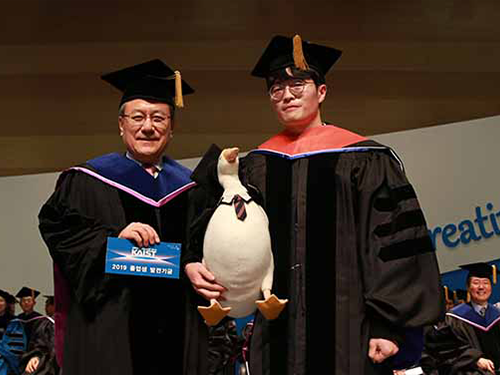 KAIST 2019 Commencement at a Glance
(KAIST 2019 Commencement Ceremony)
This year, KAIST awarded a total of 2,705 degrees: 654 PhD degrees, 1,255 master’s degrees, and 796 bachelor’s degrees. Including this year’s numbers, KAIST has conferred a total of 63,830 degrees since its foundation in 1971.
Parents, family, and friends came to campus to congratulate the graduates with big smiles and hugs. Faculty and staff members also attended the ceremony to celebrate their graduation. This year, distinguished guests including National Assembly Member Kyung-Jin Kim and Vice Minister for Science, Technology and Innovation Dae-sik came to celebrate the day with the KAIST community.
During the commencement, KAIST also announced the recipients of its undergraduate academic awards. The Minister of Science and ICT Award was won by Do-Yoon Kim from the Department of Aerospace Engineering, the KAIST Board of Trustee Chairperson Award went to Se-rin Lee from the Department of Materials Science and Engineering, the KAIST Presidential Award was won by Hee-Ju Kim from the Department of Physics, the KAIST Alumni Association President Award went to Hyeon-Seong Park from the School of Electrical Engineering, and finally the KAIST Development Foundation Chairperson Award was won by Gyeong-Hoon Lee from the Department of Mathematical Sciences.
This year’s valedictorian Eun-Seok Jeong from the School of Computing said, “I believe that we are able to stand here today because we challenged ourselves to confront our shortcomings and our uncertainty. If we continue to develop, we will become a better person than we were yesterday.”
(KAIST President Sung-Chul Shin and Woo-Seok Jeong, '19 PhD in Aerospace Engineering)
As a KAIST alumnus and fellow scientist, President Sung-Chul Shin offered his congratulations and emphasized that graduates should continue to pursue the C³ spirit. “In this age of great transformation, embrace challenges and exercise creativity as you have learnt through your education and research at KAIST. And keep in mind the importance of caring for others. Please remember that challenge and creativity will have more meaning if rendered with a caring spirit,” he said.
2019.02.15 View 10475
KAIST 2019 Commencement at a Glance
(KAIST 2019 Commencement Ceremony)
This year, KAIST awarded a total of 2,705 degrees: 654 PhD degrees, 1,255 master’s degrees, and 796 bachelor’s degrees. Including this year’s numbers, KAIST has conferred a total of 63,830 degrees since its foundation in 1971.
Parents, family, and friends came to campus to congratulate the graduates with big smiles and hugs. Faculty and staff members also attended the ceremony to celebrate their graduation. This year, distinguished guests including National Assembly Member Kyung-Jin Kim and Vice Minister for Science, Technology and Innovation Dae-sik came to celebrate the day with the KAIST community.
During the commencement, KAIST also announced the recipients of its undergraduate academic awards. The Minister of Science and ICT Award was won by Do-Yoon Kim from the Department of Aerospace Engineering, the KAIST Board of Trustee Chairperson Award went to Se-rin Lee from the Department of Materials Science and Engineering, the KAIST Presidential Award was won by Hee-Ju Kim from the Department of Physics, the KAIST Alumni Association President Award went to Hyeon-Seong Park from the School of Electrical Engineering, and finally the KAIST Development Foundation Chairperson Award was won by Gyeong-Hoon Lee from the Department of Mathematical Sciences.
This year’s valedictorian Eun-Seok Jeong from the School of Computing said, “I believe that we are able to stand here today because we challenged ourselves to confront our shortcomings and our uncertainty. If we continue to develop, we will become a better person than we were yesterday.”
(KAIST President Sung-Chul Shin and Woo-Seok Jeong, '19 PhD in Aerospace Engineering)
As a KAIST alumnus and fellow scientist, President Sung-Chul Shin offered his congratulations and emphasized that graduates should continue to pursue the C³ spirit. “In this age of great transformation, embrace challenges and exercise creativity as you have learnt through your education and research at KAIST. And keep in mind the importance of caring for others. Please remember that challenge and creativity will have more meaning if rendered with a caring spirit,” he said.
2019.02.15 View 10475 -
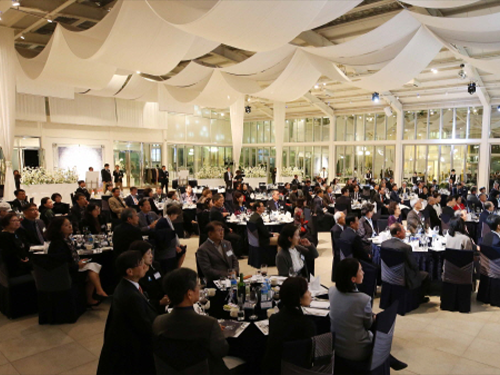 KAIST Thanks Supporters for Building KAIST of Today
KAIST hosted its first Fundraising Gala on October 26, 2018. It was organized to demonstrate deep gratitude to those who have made contributions to KAIST, making it possible to progress every year.
The KAIST Development Foundation (KDF) endeavored to make a meaningful and inclusive event by collecting archives that show the history of donations while sending invitatio ns to all the members of KAIST, including donors and potential donors as well as professors and student representatives.
Approximately 200 distinguished guests attended the gala, including major donors, Chairperson of KDF Soo Young Lee and Chairman Beang Ho Kim, Former Minister of Science Dr. Geun Mo Jung, Former Minister of Science and Technology Woo Sik Kim, and KAIST alumni including the first Korean astronaut So-Yeon Yi.
(Student cheer leading club, ELKA)
At the gala, KAIST shared its 47 years of funding and an expenditure summary with major performances achieved from the year it was founded. According to the summary, KAIST has received more than 323.1 billion won since 1971. The total number of donors was 12,906 while the number of contribution reached 77,710.
Among the total funding (323.1 billion won), corporate gifts made up 43.1% of the total and individual gifts stood at 39.1%, showing that KAIST has received and is receiving support evenly from companies and individuals.
Taking a close look at the major donors, there is an interesting fact about KAIST’s fundraising culture. There has been continuous support from individuals who did not have any personal or academic ties with KAIST before donating. However, they have made large gifts to KAIST so that the best students in the fields of science and technology can be fostered for the sake of national development. The major donors included Young Han Kim (1999), Moon Soul Chung (2001), Byiung Joon Park (2007), Keun Chul Ryu (2008), Beong Ho Kim (2009), Chun Shik Cho and E won Oh (2010), Soo Young Lee (2012), Tae-won Chey (2014), Jeong Ja Cho (2015), and Chang Kun Sohn (2017).
Especially, M. S. Chung, B. H. Kim, C. S. Cho and S. Y. Lee made additional mega-gifts to KAIST, showing continuous support for KAIST’s development.
Nevertheless, the KAIST fundraising culture could not be created with major donors only. Among the total number of donors (12,906), alumni showed the strong engagement standing at 40.4% while parents and students were at 26.1% and 12.7% respectively. The contribution numbers follow the order of alumni (34.8%), parents (20.3%), staff (20%), professors (13.3%), and students (5.7%). These statistics imply that individual’s constant donations play a significant part in the fundraising culture of KAIST.
Additionally, engagement continues to rise every year, and it reached 12,039 gifts in 2017, which increased 5.7 times over ten years.
(from left: Executive Director of KDF Young-gul Kim KAIST President Sung-Chul Shin)
These valuable gifts are the vital fuel for KAIST’s progress. As of 2018, KAIST has spent 205.8 billion won: 81.9 billion won for construction and facilities operation, 79.7 billion won for academics and research, 39 billion won for academic management, and 5.2 billion won for scholarships.
The construction and facilities operation fund aided the evolution of physical infrastructure. KAIST endowed the ChungMoonSoul Building for promoting convergence between information and biotechnology, the Yang Bun Soon Building for bio and brain engineering studies, and the Chunghi & Byiung Jun Park KI Building for multi and interdisciplinary research. Their generous gifts built the foundation for KAIST taking off towards becoming a global leading university.
Meanwhile, the academic and research funds provided opportunities to professors and students to carry out creative research and academic missions. The academic management fund helped open new departments (i.e. The Cho Chun Shik Graduate School of Green Transportation and the Moon Soul Graduate School of Future Strategy) and their programs, for which their names came from the major donors.
(The first Korean astronaut So-Yeon Yi)
At the gala, special events were held for two exclusive moments that contributed to promoting and making a better image for KAIST to the public. One was the 10th anniversary of the space exploration of the first Korean astronaut Dr. Yi. The other was the 20th anniversary of the TV drama series, called ‘KAIST’ which was aired from 1999 to 2000. The writer and main casting crew members joined the event. They said that it was their first time to gather in one place after the show last aired and this event would be memorable for them as well.
President Sung-Chul Shin said, “These gifts play the role of seed money that helps KAIST obtain competence in a global scenario. I hope people have more interest in supporting KAIST through this event.”
1 Total Amount of Gift
2 Total Donors
3 Expenditure Number of Contribution
4 Expenditure
2018.10.29 View 7760
KAIST Thanks Supporters for Building KAIST of Today
KAIST hosted its first Fundraising Gala on October 26, 2018. It was organized to demonstrate deep gratitude to those who have made contributions to KAIST, making it possible to progress every year.
The KAIST Development Foundation (KDF) endeavored to make a meaningful and inclusive event by collecting archives that show the history of donations while sending invitatio ns to all the members of KAIST, including donors and potential donors as well as professors and student representatives.
Approximately 200 distinguished guests attended the gala, including major donors, Chairperson of KDF Soo Young Lee and Chairman Beang Ho Kim, Former Minister of Science Dr. Geun Mo Jung, Former Minister of Science and Technology Woo Sik Kim, and KAIST alumni including the first Korean astronaut So-Yeon Yi.
(Student cheer leading club, ELKA)
At the gala, KAIST shared its 47 years of funding and an expenditure summary with major performances achieved from the year it was founded. According to the summary, KAIST has received more than 323.1 billion won since 1971. The total number of donors was 12,906 while the number of contribution reached 77,710.
Among the total funding (323.1 billion won), corporate gifts made up 43.1% of the total and individual gifts stood at 39.1%, showing that KAIST has received and is receiving support evenly from companies and individuals.
Taking a close look at the major donors, there is an interesting fact about KAIST’s fundraising culture. There has been continuous support from individuals who did not have any personal or academic ties with KAIST before donating. However, they have made large gifts to KAIST so that the best students in the fields of science and technology can be fostered for the sake of national development. The major donors included Young Han Kim (1999), Moon Soul Chung (2001), Byiung Joon Park (2007), Keun Chul Ryu (2008), Beong Ho Kim (2009), Chun Shik Cho and E won Oh (2010), Soo Young Lee (2012), Tae-won Chey (2014), Jeong Ja Cho (2015), and Chang Kun Sohn (2017).
Especially, M. S. Chung, B. H. Kim, C. S. Cho and S. Y. Lee made additional mega-gifts to KAIST, showing continuous support for KAIST’s development.
Nevertheless, the KAIST fundraising culture could not be created with major donors only. Among the total number of donors (12,906), alumni showed the strong engagement standing at 40.4% while parents and students were at 26.1% and 12.7% respectively. The contribution numbers follow the order of alumni (34.8%), parents (20.3%), staff (20%), professors (13.3%), and students (5.7%). These statistics imply that individual’s constant donations play a significant part in the fundraising culture of KAIST.
Additionally, engagement continues to rise every year, and it reached 12,039 gifts in 2017, which increased 5.7 times over ten years.
(from left: Executive Director of KDF Young-gul Kim KAIST President Sung-Chul Shin)
These valuable gifts are the vital fuel for KAIST’s progress. As of 2018, KAIST has spent 205.8 billion won: 81.9 billion won for construction and facilities operation, 79.7 billion won for academics and research, 39 billion won for academic management, and 5.2 billion won for scholarships.
The construction and facilities operation fund aided the evolution of physical infrastructure. KAIST endowed the ChungMoonSoul Building for promoting convergence between information and biotechnology, the Yang Bun Soon Building for bio and brain engineering studies, and the Chunghi & Byiung Jun Park KI Building for multi and interdisciplinary research. Their generous gifts built the foundation for KAIST taking off towards becoming a global leading university.
Meanwhile, the academic and research funds provided opportunities to professors and students to carry out creative research and academic missions. The academic management fund helped open new departments (i.e. The Cho Chun Shik Graduate School of Green Transportation and the Moon Soul Graduate School of Future Strategy) and their programs, for which their names came from the major donors.
(The first Korean astronaut So-Yeon Yi)
At the gala, special events were held for two exclusive moments that contributed to promoting and making a better image for KAIST to the public. One was the 10th anniversary of the space exploration of the first Korean astronaut Dr. Yi. The other was the 20th anniversary of the TV drama series, called ‘KAIST’ which was aired from 1999 to 2000. The writer and main casting crew members joined the event. They said that it was their first time to gather in one place after the show last aired and this event would be memorable for them as well.
President Sung-Chul Shin said, “These gifts play the role of seed money that helps KAIST obtain competence in a global scenario. I hope people have more interest in supporting KAIST through this event.”
1 Total Amount of Gift
2 Total Donors
3 Expenditure Number of Contribution
4 Expenditure
2018.10.29 View 7760 -
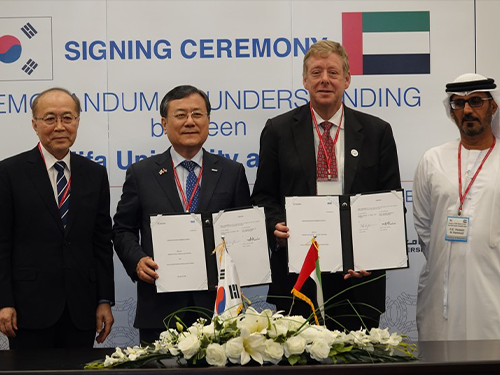 KAIST-KU Sign MOU on 4th Industrial Technology Development
(President Shin(second from left) poses with Khalifa University President Tod Laursen after signing an MOU in the UAE on March 25. Far left is Chairman of the NST Kwangyun Wohn and far right is the UAE Minister of Educatiion Hussain Al Hammadi.)
KAIST President Sung-Chul Shin and Khalifa University Interim President Tod Laursen signed an MOU on the Fourth Industrial Technology Development on March 25 in the UAE.
They signed the MOU during the UAE-ROK Nuclear Friendship and KAIST Alumni Night at Khalifa University co-hosted by KAIST and the Korea Atomic Energy Research Institute (KAERI). The MOU will bring new opportunities to further expand bilateral cooperation in education and training in the relevant technologies called for the era of the Fourth Industrial Revolution.
More than 100 dignitaries including Chairman of National Research Council of Science and Technology (NST) in Korea Dr. Kwangyun Wohn, President of KAERI Jaejoo Ha, the UAE Minister of Education His Excellency Hussain Al Hammadi, Minister of State for Advanced Sciences Her Excellency Sarah bint Yousef Al Amiri, and His Excellency Federal Authority for Nuclear Regulation (FANR) Director General Christopher Viktorsson attended the event. In particular, a significant number of Emirati graduates of the KUSTAR-KAIST education program and many others who completed various KAIST training programs joined the event.
The Nuclear Friendship Night was celebrating the completion of the first nuclear power plant in Barakah exported by Korea. This is the first nuclear reactor in the Middle East, which is to start operation later this year. The event also coincided with Korean President Moon Jae-In’s state visit to the UAE.
KAIST and KAERI gathered distinguished leaders from the higher education and nuclear industries at the event in response to the UAE government’s top national agenda of fostering future talents and promoting the nuclear industry in order to ensure energy security.
KAIST and Khalifa University signed an initial agreement in education and research in 2009 when the governments of Korea and the UAE signed a contract to build four nuclear power plants in Barakah. Since then, the two universities have worked together closely in the areas of nuclear engineering, bio-medical engineering, robotics, mechanical engineering, chemical engineering, and materials science. With this signing on the new MOU, the partnership between the two institutions will mark the second phase of educating high-caliber human resources in science and technology of the two countries.
The KAIST Alumni Night also brought more opportunities to appreciate the achievements that the two countries have made through collaboration in education and research, mostly represented in the field of nuclear technology between KAIST and Khalifa University. During the event, KAIST graduates also shared their experiences from the education at KAIST, followed by the welcoming speeches from the UAE Minister of Education and the UAE Minister of State for Advanced Sciences.
KAIST President Shin, in his welcoming speech at the event, said, “I look forward to more students in the UAE having the opportunity to experience the world’s top-level education and global environment that KAIST offers. The collaboration with Khalifa University and the UAE is very important for building both countries’ future growth.”
KU President Laursen said, “This MOU on research cooperation focusing on technologies for the Fourth Industrial Revolution, nuclear engineering, and other technical areas will further consolidate our partnership with KAIST and support us in developing human capital suitable to take on future challenges in the science and technology sectors. We firmly believe the talent pool of experts created by this initiative will contribute to the overall economic growth of the UAE.”
2018.03.26 View 10192
KAIST-KU Sign MOU on 4th Industrial Technology Development
(President Shin(second from left) poses with Khalifa University President Tod Laursen after signing an MOU in the UAE on March 25. Far left is Chairman of the NST Kwangyun Wohn and far right is the UAE Minister of Educatiion Hussain Al Hammadi.)
KAIST President Sung-Chul Shin and Khalifa University Interim President Tod Laursen signed an MOU on the Fourth Industrial Technology Development on March 25 in the UAE.
They signed the MOU during the UAE-ROK Nuclear Friendship and KAIST Alumni Night at Khalifa University co-hosted by KAIST and the Korea Atomic Energy Research Institute (KAERI). The MOU will bring new opportunities to further expand bilateral cooperation in education and training in the relevant technologies called for the era of the Fourth Industrial Revolution.
More than 100 dignitaries including Chairman of National Research Council of Science and Technology (NST) in Korea Dr. Kwangyun Wohn, President of KAERI Jaejoo Ha, the UAE Minister of Education His Excellency Hussain Al Hammadi, Minister of State for Advanced Sciences Her Excellency Sarah bint Yousef Al Amiri, and His Excellency Federal Authority for Nuclear Regulation (FANR) Director General Christopher Viktorsson attended the event. In particular, a significant number of Emirati graduates of the KUSTAR-KAIST education program and many others who completed various KAIST training programs joined the event.
The Nuclear Friendship Night was celebrating the completion of the first nuclear power plant in Barakah exported by Korea. This is the first nuclear reactor in the Middle East, which is to start operation later this year. The event also coincided with Korean President Moon Jae-In’s state visit to the UAE.
KAIST and KAERI gathered distinguished leaders from the higher education and nuclear industries at the event in response to the UAE government’s top national agenda of fostering future talents and promoting the nuclear industry in order to ensure energy security.
KAIST and Khalifa University signed an initial agreement in education and research in 2009 when the governments of Korea and the UAE signed a contract to build four nuclear power plants in Barakah. Since then, the two universities have worked together closely in the areas of nuclear engineering, bio-medical engineering, robotics, mechanical engineering, chemical engineering, and materials science. With this signing on the new MOU, the partnership between the two institutions will mark the second phase of educating high-caliber human resources in science and technology of the two countries.
The KAIST Alumni Night also brought more opportunities to appreciate the achievements that the two countries have made through collaboration in education and research, mostly represented in the field of nuclear technology between KAIST and Khalifa University. During the event, KAIST graduates also shared their experiences from the education at KAIST, followed by the welcoming speeches from the UAE Minister of Education and the UAE Minister of State for Advanced Sciences.
KAIST President Shin, in his welcoming speech at the event, said, “I look forward to more students in the UAE having the opportunity to experience the world’s top-level education and global environment that KAIST offers. The collaboration with Khalifa University and the UAE is very important for building both countries’ future growth.”
KU President Laursen said, “This MOU on research cooperation focusing on technologies for the Fourth Industrial Revolution, nuclear engineering, and other technical areas will further consolidate our partnership with KAIST and support us in developing human capital suitable to take on future challenges in the science and technology sectors. We firmly believe the talent pool of experts created by this initiative will contribute to the overall economic growth of the UAE.”
2018.03.26 View 10192 -
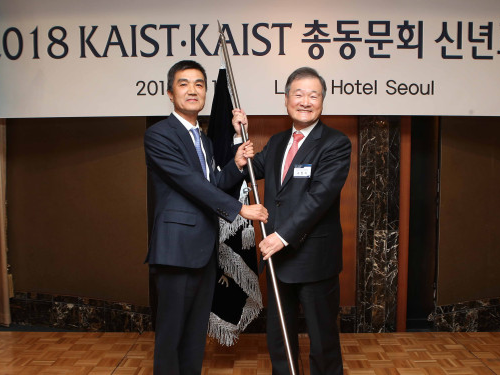 Harnessing the Strength of KAIST Alumni: New Head of KAA Inaugurated
KAIST alumni gathered in Seoul on January 13 to celebrate the New Year and the newly-elected leadership of the KAIST Alumni Association (KAA). More than 300 alumni, including President Sung-Chul Shin who is also an alumnus of KAIST, joined the gala event held at the Lotte Hotel.
Photo: Ki-Chul Cha(left) and Jung Sik Koh(right)
The KAA inaugurated its new president, Ki-Chul Cha, who was preceded by Jung Sik Koh, the former CEO at the Korea Resources Corporation. His term starts from January 2018 to December 2020.
Cha is the CEO of Inbody Co Ltd., a global company specializing in developing and selling medical instruments, such as a body composition analyzers, and medical solutions. He is also an adjunct professor in the Department of Mechanical Engineering at Yonsei University. Cha obtained a master’s degree in Mechanical Engineering at KAIST in 1980, and a Ph.D. in Bioengineering at the University of Utah, before finishing his post-doc fellowship at Harvard Medical School.
Cha plans to explore the idea that alumni engagement, saying, “KAIST stays as a home in the memories of 60,000 alumni. I will dedicate myself to stimulating the alumni association to make KAISTians proud.”
At the gala event, the KAA awarded the Alumni of the Year honor to six alumni who distinguished themselves in the areas of professional achievement, humanitarianism, and public service. They are the Director of Startup KAIST Professor Byoung Yoon Kim; President of LG Chem Ltd and Head of Battery Research and Development Myung Hwan Kim; Director of INNOX Advanced Materials Co., Ltd Kyung Ho Chang; Vice President of the Korea International Trade Association Jung-Kwan Kim; CEO of Samsung Electro-Mechanics Yun-Tae Lee; and CEO of ENF Technology Jinbae Jung.
Photo: President Shin(far right) poses with six awardees of the Distinguished Alumni Award and the former President of KAA, Koh(far left)
2018.01.16 View 10781
Harnessing the Strength of KAIST Alumni: New Head of KAA Inaugurated
KAIST alumni gathered in Seoul on January 13 to celebrate the New Year and the newly-elected leadership of the KAIST Alumni Association (KAA). More than 300 alumni, including President Sung-Chul Shin who is also an alumnus of KAIST, joined the gala event held at the Lotte Hotel.
Photo: Ki-Chul Cha(left) and Jung Sik Koh(right)
The KAA inaugurated its new president, Ki-Chul Cha, who was preceded by Jung Sik Koh, the former CEO at the Korea Resources Corporation. His term starts from January 2018 to December 2020.
Cha is the CEO of Inbody Co Ltd., a global company specializing in developing and selling medical instruments, such as a body composition analyzers, and medical solutions. He is also an adjunct professor in the Department of Mechanical Engineering at Yonsei University. Cha obtained a master’s degree in Mechanical Engineering at KAIST in 1980, and a Ph.D. in Bioengineering at the University of Utah, before finishing his post-doc fellowship at Harvard Medical School.
Cha plans to explore the idea that alumni engagement, saying, “KAIST stays as a home in the memories of 60,000 alumni. I will dedicate myself to stimulating the alumni association to make KAISTians proud.”
At the gala event, the KAA awarded the Alumni of the Year honor to six alumni who distinguished themselves in the areas of professional achievement, humanitarianism, and public service. They are the Director of Startup KAIST Professor Byoung Yoon Kim; President of LG Chem Ltd and Head of Battery Research and Development Myung Hwan Kim; Director of INNOX Advanced Materials Co., Ltd Kyung Ho Chang; Vice President of the Korea International Trade Association Jung-Kwan Kim; CEO of Samsung Electro-Mechanics Yun-Tae Lee; and CEO of ENF Technology Jinbae Jung.
Photo: President Shin(far right) poses with six awardees of the Distinguished Alumni Award and the former President of KAA, Koh(far left)
2018.01.16 View 10781 -
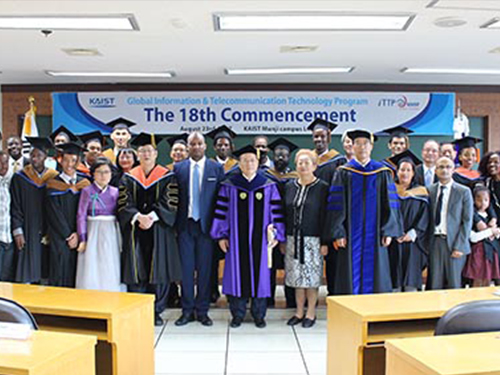 Global ITTP Graduates 12 Public Officials from 11 Countries
The 18th Global Information and Telecommunication Technology Program (ITTP) graduated 12 public officials from 11 countries in a commencement ceremony held on August 23.
Distinguished guests, faculty, and family of graduates including President Sung-Chul Shin, the Chair of the School of Business and Technology Youngsun Kown, and the Director of Global ITTP Jaejung Rho attended the commencement. Ghana Ambassador Joseph Agoe, Mrs. Lyudmila Fen, the spouse of Uzbekistan Ambassador Vitali Fen, and other dignitaries came to congratulate the 12 master’s students on their successful graduation.
The Global ITTP was launched in 2006 and offers customized master’s and doctoral degree programs to elite public officials from diverse countries on information and communication technology. This program plays a vital role for transferring Korea’s advanced ICT to countries whose industries are in the budding stages. Since 2006, the program has produced 181 alumni (48 PhDs and 133 masters) from 60 countries.
In his congratulatory message during the ceremony, President Shin congratulated the graduates on the long journey they had been through while completing their courses and welcomed the newest addition of KAIST 12 alumni.
“Back in the 1960s, Korea was one of the poorest countries in the world. Korea’s GDP stood at less than 100 US dollars. Through it all, Korean companies are now taking the lead in the global high-tech market, emerging as movers and shakers. I believe that ‘VIP’ changed it all; in other words, visionary leaders, innovative ideas, and passionate people all combined to make the difference in Korea,” said President Shin.
He also shared a new formula for success in the wake of the new industrial environment of the Fourth Industrial Revolution with the graduates who will soon begin a new ambitious professional journey in their countries. “I think Innovation, Collaboration, and Speed will be the key words to make a difference in every sector of each and every country in this dynamic new era. When making a national development strategies, please keep in mind ‘ICS’ for the development of your country as well as the world’s sustainable development.”
Finally, he said, “As a KAIST alumnus, always be sincere wherever you work and whatever you do during your service. I advise you to become a leader who is doing one’s best at all times.”
☞ Link to the 18th commencement address
2017.08.24 View 7157
Global ITTP Graduates 12 Public Officials from 11 Countries
The 18th Global Information and Telecommunication Technology Program (ITTP) graduated 12 public officials from 11 countries in a commencement ceremony held on August 23.
Distinguished guests, faculty, and family of graduates including President Sung-Chul Shin, the Chair of the School of Business and Technology Youngsun Kown, and the Director of Global ITTP Jaejung Rho attended the commencement. Ghana Ambassador Joseph Agoe, Mrs. Lyudmila Fen, the spouse of Uzbekistan Ambassador Vitali Fen, and other dignitaries came to congratulate the 12 master’s students on their successful graduation.
The Global ITTP was launched in 2006 and offers customized master’s and doctoral degree programs to elite public officials from diverse countries on information and communication technology. This program plays a vital role for transferring Korea’s advanced ICT to countries whose industries are in the budding stages. Since 2006, the program has produced 181 alumni (48 PhDs and 133 masters) from 60 countries.
In his congratulatory message during the ceremony, President Shin congratulated the graduates on the long journey they had been through while completing their courses and welcomed the newest addition of KAIST 12 alumni.
“Back in the 1960s, Korea was one of the poorest countries in the world. Korea’s GDP stood at less than 100 US dollars. Through it all, Korean companies are now taking the lead in the global high-tech market, emerging as movers and shakers. I believe that ‘VIP’ changed it all; in other words, visionary leaders, innovative ideas, and passionate people all combined to make the difference in Korea,” said President Shin.
He also shared a new formula for success in the wake of the new industrial environment of the Fourth Industrial Revolution with the graduates who will soon begin a new ambitious professional journey in their countries. “I think Innovation, Collaboration, and Speed will be the key words to make a difference in every sector of each and every country in this dynamic new era. When making a national development strategies, please keep in mind ‘ICS’ for the development of your country as well as the world’s sustainable development.”
Finally, he said, “As a KAIST alumnus, always be sincere wherever you work and whatever you do during your service. I advise you to become a leader who is doing one’s best at all times.”
☞ Link to the 18th commencement address
2017.08.24 View 7157 -
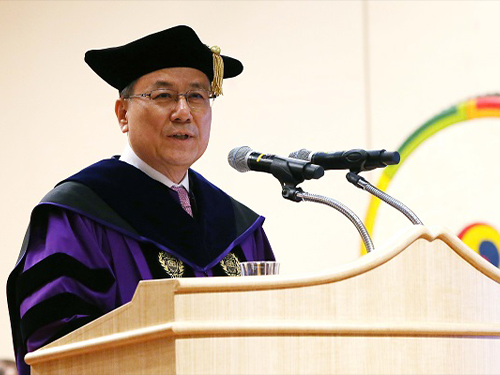 Dr.Sung-Chul Shin Inaugurated as the 16th President of KAIST
(President Shin delivers his inaugural address at the inauguration ceremony on March 15.)
Professor Sung-Chul Shin was officially inaugurated as its 16th president of KAIST on March 15 in a ceremony at the KAIST Auditorium.
The celebration began with a procession by dignitaries including the KAIST Board of Trustees Chairman Jang-Moo Lee, the National Academy of Sciences of Korea President Sook-Il Kwun, Daejeon City Mayor Sun-Taik Kwon, National Assemblyman Sangmin Lee, KAIST Alumni Association President Jungsik Koh. Academic leaders, foreign envoys, faculty, students, and staff members of KAIST joined the ceremony.
In his inaugural speech, President Shin presented a new vision for KAIST to become a global value creator in the Fourth Industrial Revolution. He said that KAIST has played a pivotal role in the nation’s industrialization and information revolution over the past half century and, with the advent of the new industry paradigm, KAIST should be now responsible for being a new value creator, not only serving the nation but pursuing global betterment. “KAIST should be a global hub of new knowledge and technology creation,” he emphasized.
Envisioning a “Global Value-Creative World-Leading University,” President Shin aims for KAIST to be an institution which can create global value as an innovative global leading research university. To realize this vision, he pledged to continue innovation in five areas of education, research & development, technology commercialization, globalization of the campus, and future strategy for the university and the nation.
In the educational innovation, he emphasized multidisciplinary studies, team work, and leadership training for students. To this end, KAIST will expand the non-departmental courses toward entire 4-year course while concurrently operating the existing system of declaring a major in students’ second year. KAIST will offer mandatory courses in humanities, social sciences, and arts and most classes will be run by team-based learning and group research activities. “KAIST Global Leadership Center” will support students to develop the qualities required for collaboration and the global leaderships.
With respect to the research innovation, President Shin said KAIST will establish “Convergence Research Matrix” system to foster strategic research groups for interdisciplinary and convergence collaboration across a wide range of divisions and departments. “Based on the CRMS, we will identify 10 flagship future-oriented convergence research areas for KAIST to truly claim its reputation as a world-leading research university,” he said. He added he will also introduce the “Collaborative Research Lab” system to better retain the academic successes without interruption, and to improve the continuity of research. “We will strive to organize teams of professors in diverse age groups to work together in mutually complementary fields,” he added.
In terms of technological commercialization, he hopes that KAIST to be a role model. He said he will make every effort to establish a resilient R&DB environment with ideas, technologies, and entrepreneurship. KAIST will rev up a new university-industry cooperation, fully sponsoring the creation of “Technology in-Kind Investment Companies.”
KAIST will continue to take initiative for globalization. He said KAIST will create an ‘English-Only Zone’ at the campus, saying that his ultimate goal is to create Korean-English bilingual campus. He also asked the foreign community to make their effort to learn Korean and Korean culture while staying at KAIST, in an effort to embrace diversity at the campus. He plans to increase the ratio of foreign faculty from nine percent to 15 percent, while doubling the current foreign student enrollment ratio of five percent.
As for the future strategy for the university and the nation, he will soon finalize the long-term strategic plan of “Vision 2031” that will lay out a roadmap for KAIST future direction toward its 60th anniversary. KAIST will also play a fundamental role in shaping national policies and strategies for science and technology by operating think-tank groups that consist of KAIST beyond disciplines. These think-tanks will design detailed development plans for KAIST as well as for national strategies for the advancement of science and technology.
He said that such institutional innovation will not be completed without the support, dedication, and passion of all KAIST members, adding that he will strive to serve them with 3Cs (Change, Communication, and Care).
For the full text of President Shin’s inaugural address, please click.
2017.03.15 View 11024
Dr.Sung-Chul Shin Inaugurated as the 16th President of KAIST
(President Shin delivers his inaugural address at the inauguration ceremony on March 15.)
Professor Sung-Chul Shin was officially inaugurated as its 16th president of KAIST on March 15 in a ceremony at the KAIST Auditorium.
The celebration began with a procession by dignitaries including the KAIST Board of Trustees Chairman Jang-Moo Lee, the National Academy of Sciences of Korea President Sook-Il Kwun, Daejeon City Mayor Sun-Taik Kwon, National Assemblyman Sangmin Lee, KAIST Alumni Association President Jungsik Koh. Academic leaders, foreign envoys, faculty, students, and staff members of KAIST joined the ceremony.
In his inaugural speech, President Shin presented a new vision for KAIST to become a global value creator in the Fourth Industrial Revolution. He said that KAIST has played a pivotal role in the nation’s industrialization and information revolution over the past half century and, with the advent of the new industry paradigm, KAIST should be now responsible for being a new value creator, not only serving the nation but pursuing global betterment. “KAIST should be a global hub of new knowledge and technology creation,” he emphasized.
Envisioning a “Global Value-Creative World-Leading University,” President Shin aims for KAIST to be an institution which can create global value as an innovative global leading research university. To realize this vision, he pledged to continue innovation in five areas of education, research & development, technology commercialization, globalization of the campus, and future strategy for the university and the nation.
In the educational innovation, he emphasized multidisciplinary studies, team work, and leadership training for students. To this end, KAIST will expand the non-departmental courses toward entire 4-year course while concurrently operating the existing system of declaring a major in students’ second year. KAIST will offer mandatory courses in humanities, social sciences, and arts and most classes will be run by team-based learning and group research activities. “KAIST Global Leadership Center” will support students to develop the qualities required for collaboration and the global leaderships.
With respect to the research innovation, President Shin said KAIST will establish “Convergence Research Matrix” system to foster strategic research groups for interdisciplinary and convergence collaboration across a wide range of divisions and departments. “Based on the CRMS, we will identify 10 flagship future-oriented convergence research areas for KAIST to truly claim its reputation as a world-leading research university,” he said. He added he will also introduce the “Collaborative Research Lab” system to better retain the academic successes without interruption, and to improve the continuity of research. “We will strive to organize teams of professors in diverse age groups to work together in mutually complementary fields,” he added.
In terms of technological commercialization, he hopes that KAIST to be a role model. He said he will make every effort to establish a resilient R&DB environment with ideas, technologies, and entrepreneurship. KAIST will rev up a new university-industry cooperation, fully sponsoring the creation of “Technology in-Kind Investment Companies.”
KAIST will continue to take initiative for globalization. He said KAIST will create an ‘English-Only Zone’ at the campus, saying that his ultimate goal is to create Korean-English bilingual campus. He also asked the foreign community to make their effort to learn Korean and Korean culture while staying at KAIST, in an effort to embrace diversity at the campus. He plans to increase the ratio of foreign faculty from nine percent to 15 percent, while doubling the current foreign student enrollment ratio of five percent.
As for the future strategy for the university and the nation, he will soon finalize the long-term strategic plan of “Vision 2031” that will lay out a roadmap for KAIST future direction toward its 60th anniversary. KAIST will also play a fundamental role in shaping national policies and strategies for science and technology by operating think-tank groups that consist of KAIST beyond disciplines. These think-tanks will design detailed development plans for KAIST as well as for national strategies for the advancement of science and technology.
He said that such institutional innovation will not be completed without the support, dedication, and passion of all KAIST members, adding that he will strive to serve them with 3Cs (Change, Communication, and Care).
For the full text of President Shin’s inaugural address, please click.
2017.03.15 View 11024 -
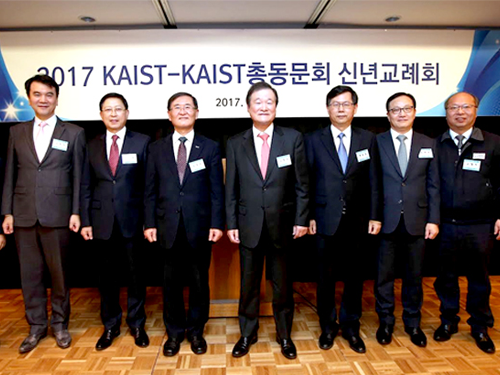 KAIST Alumni of the Year
(From left Chul-Hwan Kim, president and CEO of Orange Power, Hooshik Kim, president & CEO of Vieworks, Chilhee Chung, presient of Samsung Advanced Institute of Technology, KAIST President Sung-Mo Kang, KAIST Alumni Association President Jung-Sik Ko, Won-Pil Baek, senior vice president for R&D program at Korea Atomic Energy Research Insitute, Hyonho Jung, CEO of Medytox, Jaehwa Kim on behalf of Han-Oh Park, president & CEO of Bioneer Corporation)
The KAIST Alumni Association presented the Alumni of the Year award to six of its most accomplished alumni at the New Year dinner held at the Lotte Hotel in Seoul on January 14.
KAIST alumni community, which numbers over 500,000, has made a significant impact around the globe in science and technology, industry, education, and the public sector. Each year, the KAIST Alumni Association honors individuals who have made a significant contribution with outstanding leadership through the Alumni of the Year awards.
KAIST Alumni Association President Jung-Sik Ko awarded the recipients at the dinner. About 200 alumni, faculty, and students, including KAIST President Sung-Mo Kang, joined the celebration.
The 2016 awardees are Dr. Chilhee Chung, president of Samsung Advanced Institute of Technology(SAIT); Dr.Won-Pil Baek, senior vice president for R&D program at Korea Atomic Energy Research Institute(KAERI); Dr.Han-Oh Park, president & CEO of Bioneer Corporation; Dr.Hyonho Jung, CEO of Medytox; Hooshik Kim, president & CEO of Vieworks; and Dr.Chul-Hwan Kim, president & CEO of Orange Power.
Dr. Chung of SAIT (MS in physics ’79) played a leading role in developing top-notch system semiconductors and memory device technology while serving as president of the Samsung Electronic Semiconductor R&D Center. He has focused on the development of cutting-edge future technology, the Quantum Dot, by incorporating eco-friendly materials with the highest efficiency and color purity which is cadmium-free.
Working at KAERI since 2001, Dr. Baek (Ph.D. in nuclear and quantum engineering ’87) has made contributions to help Korea emerge as a nuclear technology powerhouse. He played a critical role in developing and facilitating a global nuclear safety verification facility dubbed ‘ATLAS.’ Such nuclear technological prowess led the Korean government to advance into the foreign markets, such as exporting nuclear power plants to United Arab Emirates.
The CEO of Bioneer, Dr. Park (Ph.D. in chemistry ’87) started a bio-venture in Korea. His company has developed hundreds of reagents, diagnostic kits, and advanced equipment for gene research over two decades. Bioneer has paved the way for establishing a world-class level of infrastructure in genomic technology. By developing the innovative technology "SAMiRNA ™ (Self-Assembled-Micelle-inhibitory-RNA)" that overcomes the problems in drug development, Bioneer presented a new solution for the treatment of incurable diseases. In collaboration with global pharmaceutical companies and research groups, Dr. Park has successfully led joint development in the licensing of new therapeutic medicine candidates for various incurable diseases.
Dr. Jung (Ph.D. in biological sciences ’88) founded the bio-pharmaceutical company Medytox in 2000. Medytox is the first company in Korea that commercialized botulinum toxin formulation. Medytox developed the non-animal liquid botulinum toxin formulation for the first time in the world. It successfully localized botulinum preparation that can treat various neurological diseases. Medytox’s new toxin formulation resulted in improving public health care as well as relieving the heavy dependence on importing bio-pharmaceutical products.
As the CEO of Vieworks, Kim (MS in physics ’95) succeeded in commercializing of digital X-ray. Especially, it is leading the design of optical and image systems that affect the quality of digital X-ray image. Kim’s company established related technology base, contributing to human health promotion and national industrial development.
President Kim of Orange Power (Ph.D. in chemical and biomolecular engineering ’93) is also the founder of the KITE Entrepreneurship Foundation. He launched Biogenix Co., Ltd. and Image and Materials Co. in 2005. In order to nurture an entrepreneurship and start-ups eco-system, he invested 10 billion KRW from the proceeds of the sale of one of his start-ups. In addition, he started Orange Power Co., Ltd. in 2012 to solve the secondary battery heat problem and established a global partnership with Hydro Quebec in Canada, Nexion in UK, Volkswagen of Germany, and Tesla of the US.
2017.01.16 View 12118
KAIST Alumni of the Year
(From left Chul-Hwan Kim, president and CEO of Orange Power, Hooshik Kim, president & CEO of Vieworks, Chilhee Chung, presient of Samsung Advanced Institute of Technology, KAIST President Sung-Mo Kang, KAIST Alumni Association President Jung-Sik Ko, Won-Pil Baek, senior vice president for R&D program at Korea Atomic Energy Research Insitute, Hyonho Jung, CEO of Medytox, Jaehwa Kim on behalf of Han-Oh Park, president & CEO of Bioneer Corporation)
The KAIST Alumni Association presented the Alumni of the Year award to six of its most accomplished alumni at the New Year dinner held at the Lotte Hotel in Seoul on January 14.
KAIST alumni community, which numbers over 500,000, has made a significant impact around the globe in science and technology, industry, education, and the public sector. Each year, the KAIST Alumni Association honors individuals who have made a significant contribution with outstanding leadership through the Alumni of the Year awards.
KAIST Alumni Association President Jung-Sik Ko awarded the recipients at the dinner. About 200 alumni, faculty, and students, including KAIST President Sung-Mo Kang, joined the celebration.
The 2016 awardees are Dr. Chilhee Chung, president of Samsung Advanced Institute of Technology(SAIT); Dr.Won-Pil Baek, senior vice president for R&D program at Korea Atomic Energy Research Institute(KAERI); Dr.Han-Oh Park, president & CEO of Bioneer Corporation; Dr.Hyonho Jung, CEO of Medytox; Hooshik Kim, president & CEO of Vieworks; and Dr.Chul-Hwan Kim, president & CEO of Orange Power.
Dr. Chung of SAIT (MS in physics ’79) played a leading role in developing top-notch system semiconductors and memory device technology while serving as president of the Samsung Electronic Semiconductor R&D Center. He has focused on the development of cutting-edge future technology, the Quantum Dot, by incorporating eco-friendly materials with the highest efficiency and color purity which is cadmium-free.
Working at KAERI since 2001, Dr. Baek (Ph.D. in nuclear and quantum engineering ’87) has made contributions to help Korea emerge as a nuclear technology powerhouse. He played a critical role in developing and facilitating a global nuclear safety verification facility dubbed ‘ATLAS.’ Such nuclear technological prowess led the Korean government to advance into the foreign markets, such as exporting nuclear power plants to United Arab Emirates.
The CEO of Bioneer, Dr. Park (Ph.D. in chemistry ’87) started a bio-venture in Korea. His company has developed hundreds of reagents, diagnostic kits, and advanced equipment for gene research over two decades. Bioneer has paved the way for establishing a world-class level of infrastructure in genomic technology. By developing the innovative technology "SAMiRNA ™ (Self-Assembled-Micelle-inhibitory-RNA)" that overcomes the problems in drug development, Bioneer presented a new solution for the treatment of incurable diseases. In collaboration with global pharmaceutical companies and research groups, Dr. Park has successfully led joint development in the licensing of new therapeutic medicine candidates for various incurable diseases.
Dr. Jung (Ph.D. in biological sciences ’88) founded the bio-pharmaceutical company Medytox in 2000. Medytox is the first company in Korea that commercialized botulinum toxin formulation. Medytox developed the non-animal liquid botulinum toxin formulation for the first time in the world. It successfully localized botulinum preparation that can treat various neurological diseases. Medytox’s new toxin formulation resulted in improving public health care as well as relieving the heavy dependence on importing bio-pharmaceutical products.
As the CEO of Vieworks, Kim (MS in physics ’95) succeeded in commercializing of digital X-ray. Especially, it is leading the design of optical and image systems that affect the quality of digital X-ray image. Kim’s company established related technology base, contributing to human health promotion and national industrial development.
President Kim of Orange Power (Ph.D. in chemical and biomolecular engineering ’93) is also the founder of the KITE Entrepreneurship Foundation. He launched Biogenix Co., Ltd. and Image and Materials Co. in 2005. In order to nurture an entrepreneurship and start-ups eco-system, he invested 10 billion KRW from the proceeds of the sale of one of his start-ups. In addition, he started Orange Power Co., Ltd. in 2012 to solve the secondary battery heat problem and established a global partnership with Hydro Quebec in Canada, Nexion in UK, Volkswagen of Germany, and Tesla of the US.
2017.01.16 View 12118 -
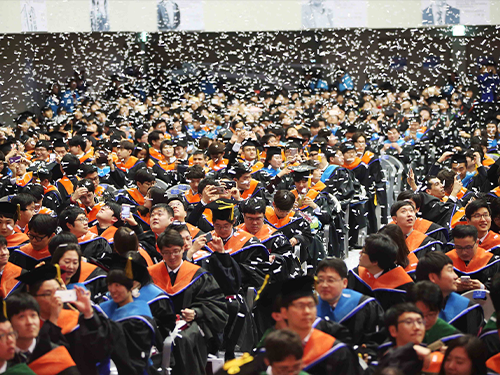 KAIST Commencement 2016
KAIST hosted its 2016 commencement ceremony on February 19, 2016 at the Sports Complex on campus.
KAIST celebrated the event with five thousand participants including graduating students, faculty, guests, Vice Minister Nam-Ki Hong of Science, ICT and Future Planning of Korea, Chairman Jang-Moo Lee of KAIST's Board of Trustees, and President Jeong-Sik Ko of the KAIST Alumni Association.
President Patrick Aebischer of the Swiss Federal Institute of Technology in Lausanne (EPFL), Switzerland, and the former Speaker of the National Assembly of Korea Chang-Hee Kang received honorary doctorates in science and technology for their contributions to the advancement of science and engineering in education and research.
KAIST granted 570 doctoral degrees, 1,329 master’s degrees, and 867 bachelor degrees on this day.
Yoon-Bum Lee of the Chemistry Department graduated with honors; Woo-Young Jin of the Mathematical Sciences Department received the Chairman’s Award of the KAIST Board and Eun-Hee Yoo of the Biological Sciences Department for the KAIST Presidential Award. Min-Hyun Cho and Yoon-Seok Chang were recipients of the President’s Award of the KAIST Alumni Association and the President’s Award of the University Supporting Association, respectively.
President Steve Kang addressed the ceremony and congratulated the graduates, saying,
“Now, your task is to make significant contributions to your communities: be leaders in your fields and remain active members of society. Given your academic knowledge and vision for the future, I encourage you to dream big.”
2016.02.23 View 42418
KAIST Commencement 2016
KAIST hosted its 2016 commencement ceremony on February 19, 2016 at the Sports Complex on campus.
KAIST celebrated the event with five thousand participants including graduating students, faculty, guests, Vice Minister Nam-Ki Hong of Science, ICT and Future Planning of Korea, Chairman Jang-Moo Lee of KAIST's Board of Trustees, and President Jeong-Sik Ko of the KAIST Alumni Association.
President Patrick Aebischer of the Swiss Federal Institute of Technology in Lausanne (EPFL), Switzerland, and the former Speaker of the National Assembly of Korea Chang-Hee Kang received honorary doctorates in science and technology for their contributions to the advancement of science and engineering in education and research.
KAIST granted 570 doctoral degrees, 1,329 master’s degrees, and 867 bachelor degrees on this day.
Yoon-Bum Lee of the Chemistry Department graduated with honors; Woo-Young Jin of the Mathematical Sciences Department received the Chairman’s Award of the KAIST Board and Eun-Hee Yoo of the Biological Sciences Department for the KAIST Presidential Award. Min-Hyun Cho and Yoon-Seok Chang were recipients of the President’s Award of the KAIST Alumni Association and the President’s Award of the University Supporting Association, respectively.
President Steve Kang addressed the ceremony and congratulated the graduates, saying,
“Now, your task is to make significant contributions to your communities: be leaders in your fields and remain active members of society. Given your academic knowledge and vision for the future, I encourage you to dream big.”
2016.02.23 View 42418 -
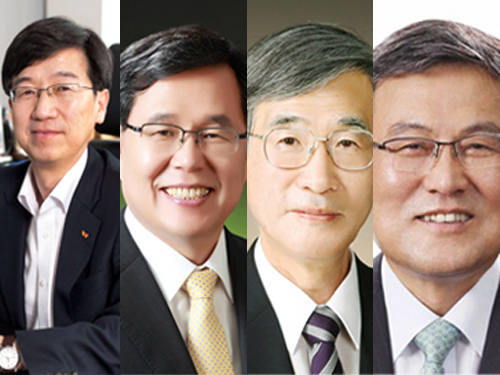 KAIST Announces the Recipients of Distinguished Alumni Awards
The KAIST Alumni Association (KAA) announced four “Proud KAIST Alumni” awards recipients for the year 2014: Sung-Wook Park, the Chief Executive Officer and President of SK Hynix; Seung Ho Shin, the President of Kangwon National University; Kew-Ho Lee, the President of the Korea Research Institute of Chemical Technology; and Mun-Kee Choi, the former Minister of Science, ICT and Future Planning of the Republic of Korea. The award ceremony took place during the 2015 KAA’s New Year's ceremony on January 17, 2015 at the Palace Hotel in Seoul.
Sung-Wook Park (M.S. ’82 and Ph.D. ’88, Department of Materials Science and Engineering), the Chief Executive Officer and President of SK Hynix, has worked as an expert in the field of memory semi-conductors for the past 30 years. He developed innovative technology and improved production efficiency, enabling the Korean semi-conductor industry to become a global leader.
Seung Ho Shin (M.S. ’79 and Ph.D. ’87, Department of Physics), the President of Kangwon National University (KNU), worked in the field of optical information processing, producing excellent research achievements and teaching the next generation of scientists. As the president of KNU, he has set an exemplary leadership in higher education.
Kew-Ho Lee (M.S. ’75, Department of Chemistry), the President of the Korea Research Institute of Chemical Technology, pioneered the field of separation film production which contributed greatly to Korean technological developments. He led several domestic and international societies to facilitate dynamic exchanges between industry and academia and with the international community.
Mun-Kee Choi (M.S. ’76, Department of Industrial and Systems Engineering), the former Minister of Science, ICT and Future Planning, the Republic of Korea, is a great contributor to the information and communications technology in Korea, working as a leader in the field of broadband integrated service digital network. He is also an educator for gifted students in science and technology, and a manager of the Electronics and Telecommunications Research Institute.
The Alumni Association established the “Proud KAIST Alumni Awards” in 1992 to recognize its alumni’s outstanding contributions to Korea and KAIST.
Pictured from left to right, Sung-Wook Park (the Chief Executive Officer and President of SK Hynix), Seung Ho Shin (the President of Kangwon National University), Kew-Ho Lee (the President of the Korea Research Institute of Chemical Technology), and Mun-Kee Choi (the former Minister of Science, ICT and Future Planning)
2015.01.19 View 14991
KAIST Announces the Recipients of Distinguished Alumni Awards
The KAIST Alumni Association (KAA) announced four “Proud KAIST Alumni” awards recipients for the year 2014: Sung-Wook Park, the Chief Executive Officer and President of SK Hynix; Seung Ho Shin, the President of Kangwon National University; Kew-Ho Lee, the President of the Korea Research Institute of Chemical Technology; and Mun-Kee Choi, the former Minister of Science, ICT and Future Planning of the Republic of Korea. The award ceremony took place during the 2015 KAA’s New Year's ceremony on January 17, 2015 at the Palace Hotel in Seoul.
Sung-Wook Park (M.S. ’82 and Ph.D. ’88, Department of Materials Science and Engineering), the Chief Executive Officer and President of SK Hynix, has worked as an expert in the field of memory semi-conductors for the past 30 years. He developed innovative technology and improved production efficiency, enabling the Korean semi-conductor industry to become a global leader.
Seung Ho Shin (M.S. ’79 and Ph.D. ’87, Department of Physics), the President of Kangwon National University (KNU), worked in the field of optical information processing, producing excellent research achievements and teaching the next generation of scientists. As the president of KNU, he has set an exemplary leadership in higher education.
Kew-Ho Lee (M.S. ’75, Department of Chemistry), the President of the Korea Research Institute of Chemical Technology, pioneered the field of separation film production which contributed greatly to Korean technological developments. He led several domestic and international societies to facilitate dynamic exchanges between industry and academia and with the international community.
Mun-Kee Choi (M.S. ’76, Department of Industrial and Systems Engineering), the former Minister of Science, ICT and Future Planning, the Republic of Korea, is a great contributor to the information and communications technology in Korea, working as a leader in the field of broadband integrated service digital network. He is also an educator for gifted students in science and technology, and a manager of the Electronics and Telecommunications Research Institute.
The Alumni Association established the “Proud KAIST Alumni Awards” in 1992 to recognize its alumni’s outstanding contributions to Korea and KAIST.
Pictured from left to right, Sung-Wook Park (the Chief Executive Officer and President of SK Hynix), Seung Ho Shin (the President of Kangwon National University), Kew-Ho Lee (the President of the Korea Research Institute of Chemical Technology), and Mun-Kee Choi (the former Minister of Science, ICT and Future Planning)
2015.01.19 View 14991 -
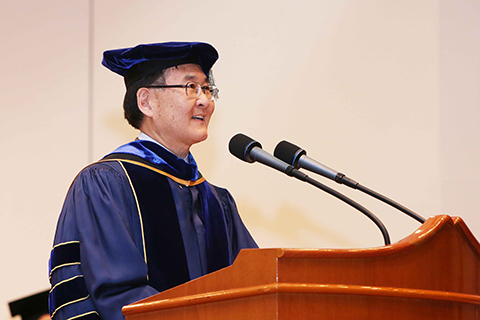 Welcoming the Class of 2014
“The four years from today will go quickly, and I urge you to make the most of your time in KAIST, a great educational and research institution where you will explore the frontiers of science and technology and take part in the creation of new knowledge,” President Kang told the freshmen at the convocation ceremony.
Freshmen Convocation for the Class of 2014 took place on March 3, 2014 at the auditorium on the main campus. Members of the KAIST community, along with hundreds of parents and guests, welcomed the incoming 800 freshmen, celebrating the beginning of their four-year college life.
Kwang-Joon Ahn, a graduate of the Korea Science Academy, and Ha-Rim Jin, a graduate of Daegu Il Science High School, were representatives of the incoming students, and they took the “Class of 2014 Pledge,” a commitment to uphold KAIST’s core values, which is "creativity and challenge (endeavoring spirit)," and to pursue intellectual passion and discovery.
President Steve Kang delivered congratulatory remarks, encouraging students to use their opportunities to the fullest while at KAIST to broaden their knowledge and experience. He also stressed the following four important principles they should cultivate to become the leaders of tomorrow: be grateful, excel in their field, keep open minds about what the globalized world would bring, and never give up on their dreams and belief.
President Kang said:
“Probably, many of you, the graduates of the best high schools in Korea, will find KAIST a tougher place to be in than you imagined. But challenges, particularly intellectual challenges, should be viewed as an opportunity to grow. It is ok to fail. In fact, without risking failures, there won’t be a meaningful growth because the real growth comes from overcoming challenges.”
“You can’t avoid failing in the course of your college life, but your perseverance to do it over will allow you to develop the skills and passion needed to become a leader who will contribute to the local community, as well as to the betterment of humanity.”
The KAIST Alumni Scholarship Foundation presented a scholarship of USD 3,700 to 24 freshmen.
The convocation ended with music performances by members of the student clubs at KAIST.
2014.03.04 View 8576
Welcoming the Class of 2014
“The four years from today will go quickly, and I urge you to make the most of your time in KAIST, a great educational and research institution where you will explore the frontiers of science and technology and take part in the creation of new knowledge,” President Kang told the freshmen at the convocation ceremony.
Freshmen Convocation for the Class of 2014 took place on March 3, 2014 at the auditorium on the main campus. Members of the KAIST community, along with hundreds of parents and guests, welcomed the incoming 800 freshmen, celebrating the beginning of their four-year college life.
Kwang-Joon Ahn, a graduate of the Korea Science Academy, and Ha-Rim Jin, a graduate of Daegu Il Science High School, were representatives of the incoming students, and they took the “Class of 2014 Pledge,” a commitment to uphold KAIST’s core values, which is "creativity and challenge (endeavoring spirit)," and to pursue intellectual passion and discovery.
President Steve Kang delivered congratulatory remarks, encouraging students to use their opportunities to the fullest while at KAIST to broaden their knowledge and experience. He also stressed the following four important principles they should cultivate to become the leaders of tomorrow: be grateful, excel in their field, keep open minds about what the globalized world would bring, and never give up on their dreams and belief.
President Kang said:
“Probably, many of you, the graduates of the best high schools in Korea, will find KAIST a tougher place to be in than you imagined. But challenges, particularly intellectual challenges, should be viewed as an opportunity to grow. It is ok to fail. In fact, without risking failures, there won’t be a meaningful growth because the real growth comes from overcoming challenges.”
“You can’t avoid failing in the course of your college life, but your perseverance to do it over will allow you to develop the skills and passion needed to become a leader who will contribute to the local community, as well as to the betterment of humanity.”
The KAIST Alumni Scholarship Foundation presented a scholarship of USD 3,700 to 24 freshmen.
The convocation ended with music performances by members of the student clubs at KAIST.
2014.03.04 View 8576 -
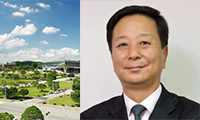 Man-Gi Paik Appointed as New President of KAIST Alumni Association
The KAIST Alumni Association selected Man-Gi Paik, a patent lawyer at the prestigious law firm of Kim & Chang in Korea, as its 22nd president. President Paik will hold the post from January 2014 to December 2015. After receiving a Masters of Science in Electrical Engineering at KAIST in 1976, President Paik attended the Wharton School of the University of Pennsylvania in the United States and obtained a Masters of Business Administration. He served as the president of the Korean Association of Intellectual Property Service and a board member of KAIST. He is currently an adjunct professor at the Graduate School of Intellectual Property, KAIST. President Paik said, “I’m honored to lead the KAIST alumni and look forward to creating many opportunities to work for the development of our alma mater.”
2014.02.03 View 9957
Man-Gi Paik Appointed as New President of KAIST Alumni Association
The KAIST Alumni Association selected Man-Gi Paik, a patent lawyer at the prestigious law firm of Kim & Chang in Korea, as its 22nd president. President Paik will hold the post from January 2014 to December 2015. After receiving a Masters of Science in Electrical Engineering at KAIST in 1976, President Paik attended the Wharton School of the University of Pennsylvania in the United States and obtained a Masters of Business Administration. He served as the president of the Korean Association of Intellectual Property Service and a board member of KAIST. He is currently an adjunct professor at the Graduate School of Intellectual Property, KAIST. President Paik said, “I’m honored to lead the KAIST alumni and look forward to creating many opportunities to work for the development of our alma mater.”
2014.02.03 View 9957